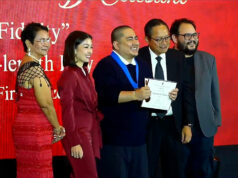YOU MIGHT think that a barista is simply the guy who hands you your coffee at the counter, but after attending the first Philippine National Barista Assembly at BGC last week, well, we certainly got an education.
The coffee conference was attended by coffee enthusiasts, coffee companies, coffee producers, 2014 World Barista Champion, Hidenori Izaki, 2018 World Barista Champion Head Judge Ross Quail, and all sorts of important names in the coffee world. In pockets throughout the SMX Convention Center in SM Aura, Taguig, competitions were under way, and in the sidelines of the Ultimate Barista Challenge, we talked to the guy who envisioned the assembly, Michael Harris Conlin, president and CEO of Henry & Sons, and the country’s 2019 National Barista Champion.
“What I really want to do is to create a fully sustainable coffee economy here in the Philippines, where everybody works together towards a beautiful coffee future,” he said.
As for the Ultimate Barista Challenge, Gian Carlo Valencia took home the top prize, and will receive training and ambassadorship under Henry & Sons. The training program aims to send the winner to the Nationals, and after that, presumably the World Barista Championships (if it all works out).
Mr. Conlin’s advocacy of helping coffee farmers through the Foundation for Sustainable Coffee Excellence is already known in coffee circles (his entry in the World Barista Championship was a cup from his Benguet farming partners), but “Now we feel that it’s up to the barista to become the ambassadors of great coffee,” he said. “We’re basically empowering the baristas with the knowledge and skill to be able to translate the hard work of our coffee farmers and the entire value chain to the consumer.” In taking up this mindset, your barista is not just handing you a cup, but summarizing the work of half a decade or so — you’re drinking the foggy mornings, the logistics of transportation, and many other things that worked together to cheer you up with a caffeine kick in the morning.
Since a cup is consumed every morning in some corner of the world, coffee as an end-product derived from real hard work is hard to distance from its status as a commodity. “The sad thing is that commodity markets are not in the hands of the farmers. It’s also not in the hands of the barista, or even the players in the coffee value chain,” said Mr. Conlin. “It’s actually in the hands of speculators. For no reason at all, coffee prices can go all the way down to less than production cost of the farmer, all the way up to crazy prices.
“What we’re doing is increasing the quality of the coffee, and by making Philippine coffee a specialty, we don’t fall under the commodities market. It becomes how much the consumer wants to pay for it.” — Joseph L. Garcia



